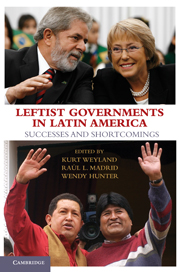Book contents
- Frontmatter
- Contents
- Acknowledgments
- Acronyms and Abbreviations
- Contributors
- 1 The Performance of Leftist Governments in Latin America: Conceptual and Theoretical Issues
- 2 The Repeating Revolution: Chávez's New Politics and Old Economics
- 3 The Challenge of Progressive Change under Evo Morales
- 4 The Chilean Left in Power: Achievements, Failures, and Omissions
- 5 From Cardoso to Lula: The Triumph of Pragmatism in Brazil
- 6 Lula's Administration at a Crossroads: The Difficult Combination of Stability and Development in Brazil
- 7 The Policies and Performance of the Contestatory and Moderate Left
- Bibliography
- Index
3 - The Challenge of Progressive Change under Evo Morales
Published online by Cambridge University Press: 05 June 2012
- Frontmatter
- Contents
- Acknowledgments
- Acronyms and Abbreviations
- Contributors
- 1 The Performance of Leftist Governments in Latin America: Conceptual and Theoretical Issues
- 2 The Repeating Revolution: Chávez's New Politics and Old Economics
- 3 The Challenge of Progressive Change under Evo Morales
- 4 The Chilean Left in Power: Achievements, Failures, and Omissions
- 5 From Cardoso to Lula: The Triumph of Pragmatism in Brazil
- 6 Lula's Administration at a Crossroads: The Difficult Combination of Stability and Development in Brazil
- 7 The Policies and Performance of the Contestatory and Moderate Left
- Bibliography
- Index
Summary
Evo Morales's presidency has caught the attention of scholars and activists in Latin America. Alain Touraine (2007) has remarked that the Bolivian left charts a “third way” with respect to both Chile under Michelle Bachelet and Venezuela under Hugo Chávez. Typologies of governance in Latin America place Bolivia on the radical wing of existing political projects (Arnson 2007; Roberts 2007). Morales's own personal trajectory and his government's strong link to social and indigenous movements have been scrutinized and contrasted with other Latin American left-wing political projects (see Stefanoni and do Alto 2006; Molina 2007). Despite the sharp political focus on Bolivia, less attention has been paid to policy outcomes and outputs or to the achievements of the administration's first term in office. This essay looks at this less-examined side of the Bolivian experiment in postneoliberal politics.
Many contentious and unresolved issues frame the Bolivian policy agenda in the present, including the nationalization of natural resources, fiscal and political decentralization, and indigenous peoples' rights, among others (Crabtree and Whitehead 2008). I argue that the Morales policy agenda, although clearly postneoliberal in the chronological sense, may not be sufficiently postneoliberal in raising labor and welfare standards at home and transforming Bolivia's role in the global economy. This is a predicament shared with most Bolivian governments of the democratic era. If the past is any guide, however, there are unlikely to be any technical fixes to Bolivia's intractable problems in the future (Gray Molina 2009).
- Type
- Chapter
- Information
- Leftist Governments in Latin AmericaSuccesses and Shortcomings, pp. 57 - 76Publisher: Cambridge University PressPrint publication year: 2010
- 24
- Cited by

